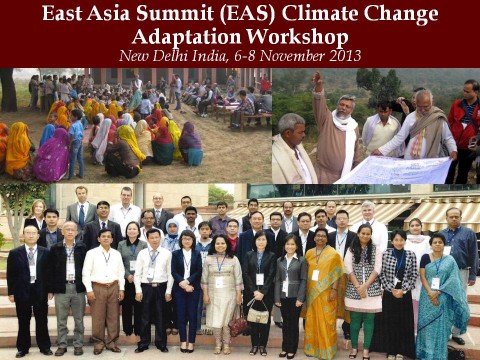OML Center at the East Asia Summit Climate Change Adaptation Workshop

OML Center at the Information Matters Project Kickoff
November 28, 2016
OML Center and PAGASA Organize Python Programming Language Training
November 28, 2016The East Asia Summit (EAS) Climate Change Adaptation Workshop successfully concluded in New Delhi, India on 6-8 November 2013. The OML Center, who will be hosting the second workshop in Manila, Philippines, was represented by Perlyn M. Pulhin. Hosted by TERI University in partnership with the Commonwealth Scientific and Industry Research Organization (CSIRO), this first workshop forms part of an initiative to build a dialogue among EAS countries on issues of common concern in the area of environment and climate change, and, more specifically, to improve regional works and knowledge sharing on climate change adaptation planning among key decision-makers and communities of practice.
The workshop was attended by delegates from EAS participating countries (Australia, Cambodia, China, India Indonesia, Laos, Malaysia, Myanmar, the Philippines, Thailand, the United States and Vietnam). Representatives from international organizations (Asian Development Bank, International Council for Local Environmental Initiatives, Food and Agriculture Organization – United Nations), along with public, private and research institutions from India also participated.
- Participants welcomed presentations and facilitated discussion on a range of climate change adaptation issues including:
- The impact of climate change on rural-urban interactions and livelihoods
- Initiatives to build community capacity to improve water and food security outcomes how science can best inform policy
- The use of technology and innovation to address food and water security outcomes in South and South-east Asia, and
- Leading practice approaches to improve community capacity to respond to food and water security in a changing climate
Delegates also participated in a field trip to the Tarun Bharat Sangh in Alwar, Rajasthan, an internationally acknowledged sit that showcases the positive impact of community-level initiatives to manage a variable and changing climate alongside several other social issues. The workshop recognized the value and importance in bringing together representatives from government, academia, and the private sector who have experience working in the areas of climate change, agricultural sustainability, disaster reduction and urban infrastructure.
The workshop focused on rural-urban interactions and livelihood, and specially the challenge of food and water security for local communities. Climate change was acknowledged as an important contributory factor that impacts on rural livelihoods and the rural-urban interface, and delegates identified opportunities to incorporate adaptation and development strategies into existing planning processes and frameworks.
Following are the opportunities and leading practice solutions identified by the delegates that could raise community capacity in responding to the challenges of food and water security in a changing climate:
- Adaptation pathways: Cross-regional processes with stakeholders can provide successful mechanisms to integrate climate change knowledge learnt from successful adaptations into existing national policies and stakeholder practices.
- This collective learning, for example through establishment of regional knowledge sharing processes and guidelines, would improve regional adaptation responses and strategies.
- Capacity building: Importance of capacity building for all stakeholders using an integrated approach at multiple levels to support climate change adaptation, for example through:
- Research, training and workshops
- Conducting multi-stakeholder dialogue
- Exchange of experts on climate change adaptation
- Using interdisciplinary approaches
- Knowledge generation and sharing: Importance of developing a shared discourse among different stakeholders on different forms of knowledge considered relevant for thinking about adaptation to climate change to be achieved through:
- Inventory of cases on combining different forms of knowledge
- A workshop on approaches to synthesize the roles of different forms of knowledge in climate change adaptation in the EAS
- A network for exchange of experiences
- Adaptive governance: Adaptation is more effective when governance is based on adaptive and flexible frameworks that empower all participants and bridge multiple dimensions of adaptation guided by the following principles:
- Uncertainty is best addressed when responses are not constrained by rigid frameworks and approaches
- The mix actors needs to be matched to the adaptation context and can include, community civil society, government, private sector and researchers
- The empowerment of actors needs to be supported by translation mechanism that bridge different languages of the diverse actors
The results of this workshop will be built-on at the second Climate Change Adaptation Workshop to be held in Manila, Philippines in February 2014. A report on the workshops will be presented at the next EAS Environment Ministers Meeting in 2014 for consideration.

